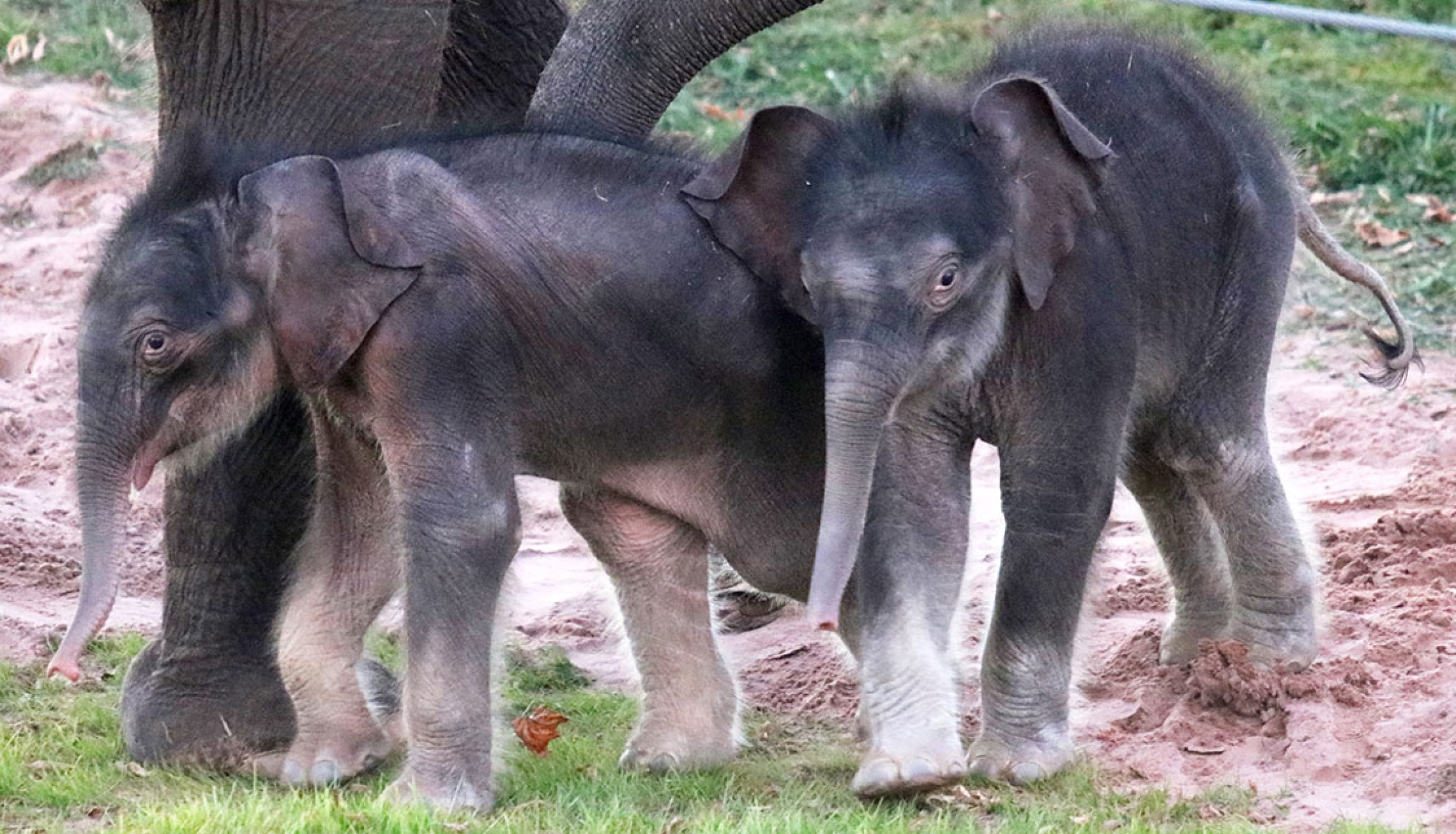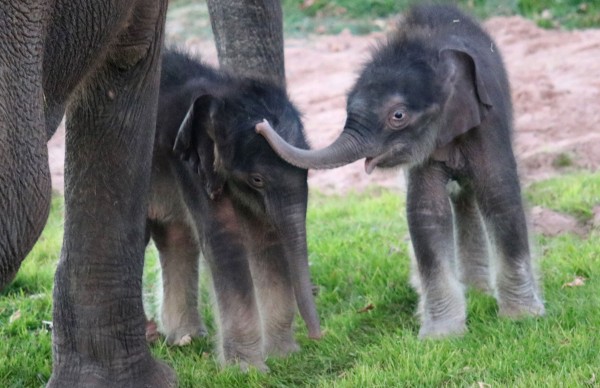Asian Elephant Delivers Miracle Twins at Rosamond Gifford Zoo

SYRACUSE, NY, November 10, 2022 – The Rosamond Gifford Zoo has made history. Male Asian elephant twins were born to parents Mali and Doc at the Rosamond Gifford Zoo on October 24, 2022.
The zoo is thrilled to announce that Mali and both her calves are currently doing well. For the past two weeks, the elephant care team has been monitoring the twins around the clock to ensure both are thriving.
Mali delivered the first calf at 2 a.m. with no complications. The calf was a male at 220 pounds and perfectly healthy.
The second calf came ten hours later at 11:50 a.m. in an event that astonished the animal care staff. The second calf was also male, weighed 237 pounds, but was noticeably weaker than the first. The zoo’s animal care team and veterinary staff sprang into action and were able to significantly improve the calf’s condition.
“This is truly an historic moment for the zoo and our community. I couldn’t be prouder of our exceptional animal care team, the support of the veterinary staff and their tremendous dedication to Mali and the twins,” said County Executive Ryan J. McMahon. “The important research happening right here at the zoo will have a significant impact worldwide on behalf of this magnificent endangered species”
Elephant twins comprise less than 1% of elephant births worldwide. Of twin pregnancies, twins are often stillborn or are too weak to survive. Sometimes the mother elephant does not survive. To date, there has never been a recorded case of surviving elephant twins in the United States. The few successful twin births have only taken place in their range countries in Asia and Africa and nowhere else in the world.
Due to the sheer improbability as well as the complexity of elephant ultrasounds, the zoo team did not anticipate the birth of twins. However, they were prepared. Elephant care staff have been supplementing the second calf with a specialized milk replacer they received days before the delivery.
“I can’t commend my team enough for all they have done these past few weeks to ensure the care and safety of Mali and her twins. It has been incredible to watch them in action and witness the high level of expertise, professionalism and focus under pressure,” said Zoo Director Ted Fox. “The continued work and research that follows will significantly contribute to global research efforts on behalf of elephant care, Elephant Endotheliotropic Herpes Virus (EEHV), and more.”
The new twins bring the zoo’s elephant herd to eight that reside at the Helga Beck Asian Elephant Preserve. The new calves will be the third generation in the herd’s family which includes Mali and her half-sister Kirina and Mali’s mother Targa – mimicking natural herd compositions in the wild. The Preserve is also home to unrelated “aunties” – matriarch Siri and Romani.
Mali’s twins are an incredible achievement for both the zoo and Asian elephant conservation worldwide.

Asian elephants are classified as Endangered by the International Union for the Conservation of Nature (IUCN). Their wild populations are threatened by human conflict, habitat destruction and ivory poachers. There are an estimated 20,000 individuals left in the wild.
The twins are a part of the zoo’s participation in the Association of Zoos and Aquariums’ Asian Elephant Species Survival Plan, a gold-standard population management and conservation program designed to save critically endangered animals. Of the 238 zoos and aquariums accredited by the AZA, only eight are Asian elephant breeding facilities.
“It is clear that zoos are places where people connect to wildlife, but they are also where the extraordinary conservation and research achievements occur,” said Dan Ashe, President and CEO of the Association of Zoos and Aquariums. “Breakthroughs in sustaining endangered animals stem from the people whose hearts and minds are fastened to their conservation mission. Saving species is why we do what we do. Congratulations to the amazing professionals at Rosamond Gifford Zoo for their remarkable achievement!”
Of extreme importance are Mali’s placentas which were immediately transported to Baylor University for elephant research. They will be studied and used for research toward the treatment and the development of a vaccine to combat EEHV, a lethal strain of herpes believed to naturally occur among elephants in a dormant form. The virus can become active without warning and is the leading cause of death among young elephants.
EEHV claimed the lives of Mali and Doc’s previous two calves, Batu and Ajay, at the zoo in December 2020.
After this tragedy, the Friends of the Zoo created the Ajay and Batu Memorial Fund in memory of the young elephants. The funds raised were used to provide EEHV resources to the zoo – including equipment to test for EEHV in-house at the zoo’s new state-of-the-art Animal Health Center.
All elephants at the zoo are tested twice a week for EEHV, and the twins will be extensively monitored for signs of the virus. The testing and research done at the Animal Health Center will contribute to the efforts to someday eradicate EEHV and help elephants both in human care and in the wild.
The Rosamond Gifford Zoo has been a leader in elephant husbandry and conservation since 1986 and with its state-of-the-art elephant care facilities, experienced elephant care team and partnership with Cornell’s Veterinary School – it continues to act as a distinguished model for elephant programs around the world.
Visitors will be able to see the elephant twins at the Helga Beck Asian Elephant Preserve daily from 11-11:30 a.m. and 2–2:30 p.m. (weather dependent) and indoors at the Pachyderm Pavilion viewing windows.


